Dementia: a UCL priority
What is dementia?
According to the World Health Organization over 55 million people have dementia worldwide. This is predicted to triple, rising to over 150 million by 2050.
Dementia is a group of symptoms caused by different diseases that damage the brain. It is a progressive condition which can affect memory, language and behaviour. Currently there is no cure.
While Alzheimer's is the most common type of dementia, there are others such as vascular dementia, frontotemporal dementia, Parkinson's and Huntington’s disease. There are also rarer forms of dementia caused by other diseases and conditions.
How is UCL tackling the global challenge?
Dementia represents one of the toughest scientific and socio-economic challenges facing our society today. UCL is here to change this by focusing our world-leading expertise on cure, prevention and care.
We are home to the national headquarters of the UK Dementia Research Institute (UK DRI), which is the single biggest investment the UK has ever made in dementia, primarily supported by the Medical Research Council, Alzheimer’s Research UK and the Alzheimer’s Society. The creation of UCL's new centre of excellence for neuroscience on Grays Inn Road will bring together the UCL Queen Square Institute of Neurology, the UK DRI headquarters and the UCLH National Hospital for Neurology and Neurosurgery under one roof with the aim of accelerating the treatment of neurological diseases.
Multidisciplinary thinking and collaboration to drive progress
We work in collaboration with the NHS and people affected by dementia, as well as with charities and academic and industry partners across the world, to share knowledge, co-develop research and drive progress.
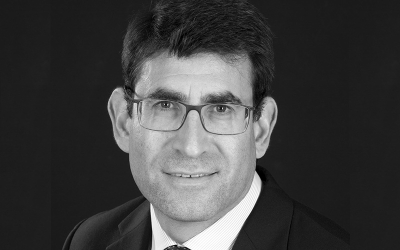
Professor Jonathan Schott on UCL’s collaborative approach to tackling dementia
Jonathan Schott is a Professor of Neurology at UCL with particular expertise in dementia and Alzheimer's disease, and Chief Medical Officer for Alzheimer's Research UK.

UCL and Eisai collaborate in R&D to find solutions for neurodegenerative conditions
UCL scientists and global research-based pharmaceutical company Eisai are working together on a research programme with the aim of developing solutions for patients with neurodegenerative conditions.
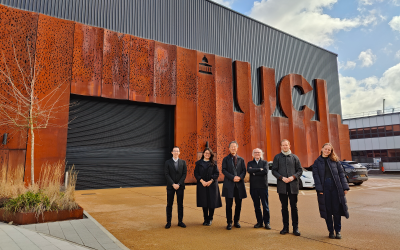
UCL and Osaka University collaborate to treat social impairment in dementia
Researchers from UCL and Osaka University in Japan are working together to develop effective treatments to help people with dementia function better socially.

Professors Niall McLaughlin and Yeoryia Manolopoulou on designing for dementia
Professors Niall McLaughlin and Yeoryia Manolopoulou from the Bartlett Faculty of the Built Environment discuss their work on designing buildings for people with dementia.
Translating research discoveries into breakthrough treatments
We research the molecular and cellular basis of neurodegenerative conditions that give rise to dementia to help us identify therapeutic targets. Our cutting-edge technology and state-of-the-art facilities support our researchers in fast-tracking the development of new treatments.

Dr Cath Mummery on using gene silencing treatments to tackle Alzheimer's
Dr Cath Mummery is leading a world-first trial involving a ‘gene silencing’ drug that has shown promise in safely and successfully lowering levels of the harmful tau protein known to cause Alzheimer's disease.
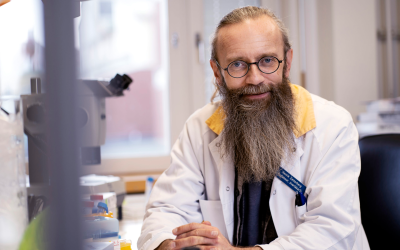
Professor Henrik Zetterberg on how biomarkers could revolutionise our understanding of Alzheimer's
Professor Henrik Zetterberg focuses on the development of biomarkers, which have huge potential to transform our understanding of disease, for brain disorders such as Alzheimer’s.

Professor Fiona Ducotterd discusses the challenges in developing drugs to treat neurodegenerative conditions like dementia.

Dr Ashvini Keshavan and her trial identifying accurate and quick blood tests to diagnose dementia
Dr Ashvini Keshavan will co-lead the Blood Biomarker Challenge, which aims to revolutionise dementia diagnosis.
Preventing dementia
We identify modifiable risk factors for neurodegenerative conditions and investigate how behavioural change and large-scale public health interventions can help. We also use brain imaging and biochemical markers to understand how we can prevent dementia before symptoms appear.
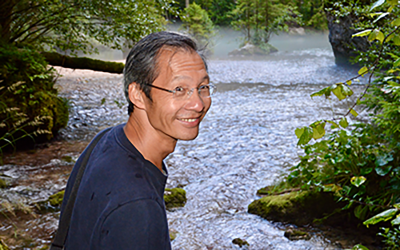
Professor Dennis Chan on detecting Alzheimer's disease at its earliest stages
Professor Dennis Chan uses virtual and augmented reality to assess spatial navigation and how this can be used to detect the potential early onset of Alzheimer's disease.
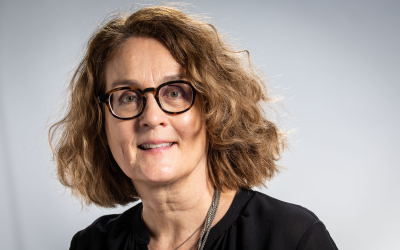
Professor Anne Schilder on the links between hearing loss and dementia
Professor Anne Schilder is an ENT surgeon and investigates the links between hearing loss and dementia.
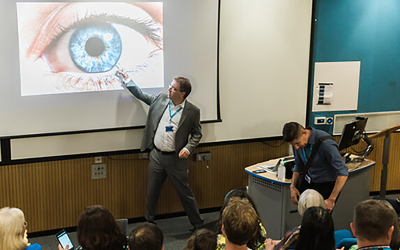
Professor Pearse Keane on using eye health to detect dementia
Professor Pearse Keane explains how using artificial intelligence to investigate the eye's retinal tissue can help diagnose dementia.

Dr Coco Newton on what navigation and virtual reality tests reveal about dementia
Dr Coco Newton investigates ways to detect dementia earlier with a particular focus on navigation and virtual reality.
Revolutionising care for those with dementia
At the heart of our work are those affected by dementia, as well as their carers and families. We focus on how to provide the best clinical care for patients and ensure that access to information, advice and support is available to everyone.
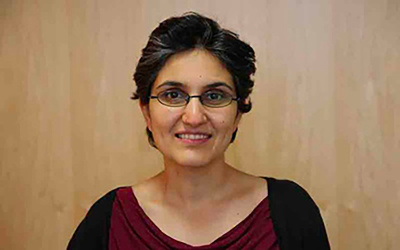
Dr Naaheed Mukadam on creating better equality in dementia diagnosis and care
Dr Naaheed Mukadam investigates the problem of ethnic inequalities in dementia diagnosis and care, and how to address the issue.
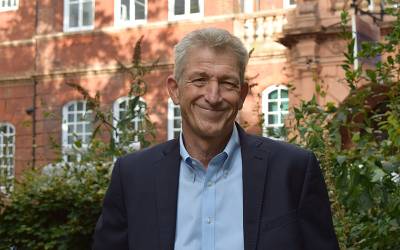
Professor Nick Fox on why we need to improve support for rare dementias
Professor Nick Fox is director of the UCL Dementia Research Centre and co-leads Rare Dementia Support, which provides support for less common, young onset and inherited dementias.
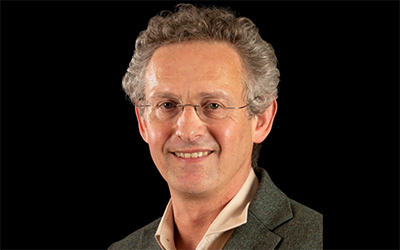
Professor Alexander Leff on the Gotcha! app helping people with dementia recall names
Professor Leff works on brain imaging studies of people with aphasia and alexia, and web-based therapies for patients with cognitive, language or visual impairments.

Dr Jem Bhatt on the negative treatment and discrimination faced by dementia carers
Dr Jem Bhatt from the UCL Unit for Stigma Research conducts psychosocial dementia research, and investigates the discrimination faced by dementia carers.
Training the next generation of dementia researchers
We are equipping the next generation of scientists and clinicians with the capability and technology they need to develop breakthrough cures and treatments that will enable us to conquer the challenge of dementia once and for all.

Q&A with Dementia MSc student and filmmaker Rianna Patterson
Rianna Patterson is a student in the Dementia: Causes, Treatments and Research (Mental Health) MSc at UCL.
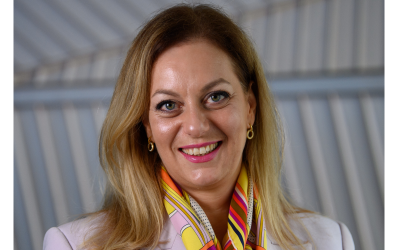
Dr Evangelia Chrysikou on designing for dementia
Dr Evangelia Chrysikou investigates the field of architecture and dementia, and how we can design for dementia.
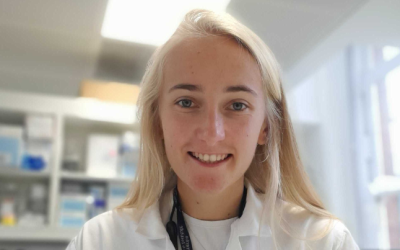
Imogen Swift is a final year PhD student at UCL focusing on a specific genetic form of frontotemporal dementia.
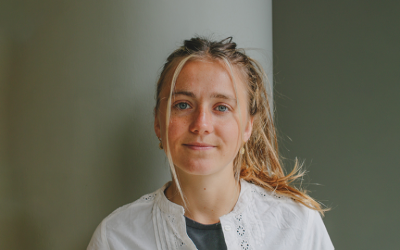
UCL’s flagship MSc is helping to meet the global dementia challenge
Find out how UCL is helping to meet the global dementia challenge by training the next generation of dementia researchers.
Related
- How UCL academics are spearheading the fight against Alzheimer’s disease
- The Jennings vs Alzheimer’s: Shaping a new “treatment era” through discovery
- Rare dementia support groups
- UCL dementia staff network
Additional features
- Meet Professor Karen Duff, Director of the UK Dementia Research Institute: Professor Karen Duff has worked for over 30 years on Alzheimer’s disease, with a particular focus on tauopathies.
- Professor John Collinge on tackling prion diseases: Professor John Collinge is Director of the MRC Prion Unit and also directs the NHS National Prion Clinic at the adjacent National Hospital for Neurology and Neurosurgery.
- Dr Victoria Garfield on how napping can preserve brain health: Dr Victoria Garfield investigates healthy ageing and how lifestyle and social factors can slow cognitive decline.
- Dr Joshua Stott on improving wellbeing in people with dementia: Dr Joshua Stott is director of the UCL ADAPT lab and studies the use of cognitive behavioural therapy and talking therapies for people with dementia.
- Dr Soyon Hong on investigating microglia and the importance of collaboration within her lab: Dr Soyon Hong is a specialist in the relationship between microglia and synapses.
- Meet Dr Vitor Zimmerer: Dr Vitor Zimmerer is a clinical linguist and cognitive scientist, with a focus on language capacity in neurodiversity and people with neurological disorders such as dementia.
- Meet Professor Selina Wray: Professor Selina Wray's lab focuses on understanding the molecular mechanisms of Alzheimer’s disease and dementia.
- Meet Dr Marc Busche: Dr Marc Busche is leading a UK Dementia Research Institute Grand Challenge project focused on developing a functional circuit biomarker for Alzheimer’s disease.
 Close
Close

